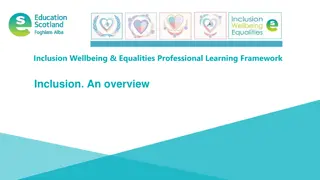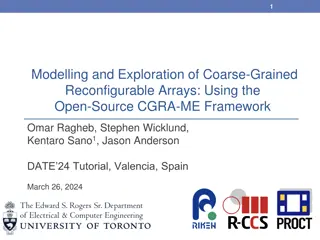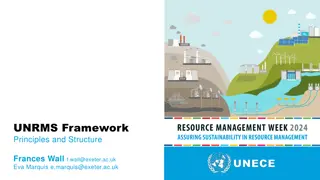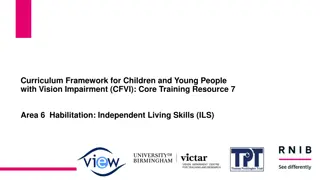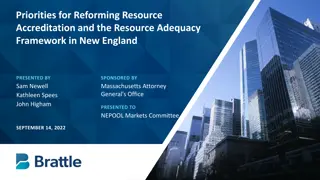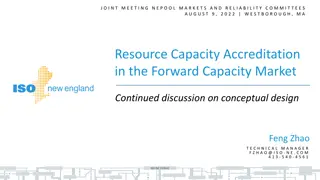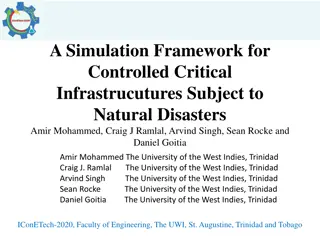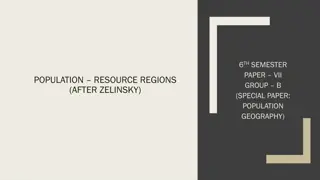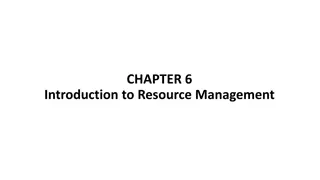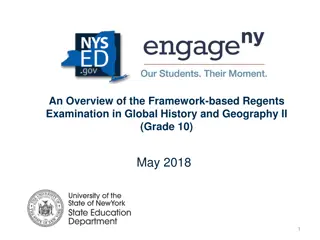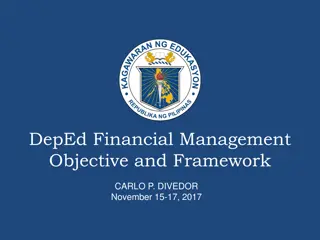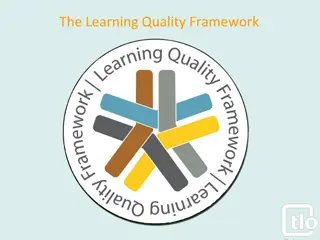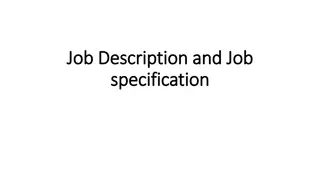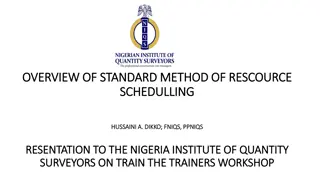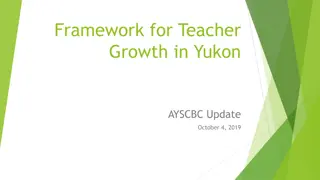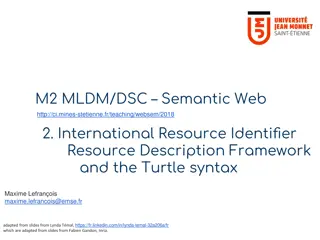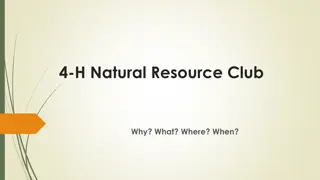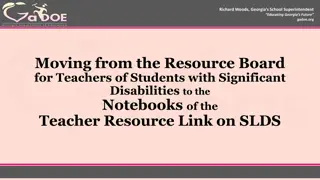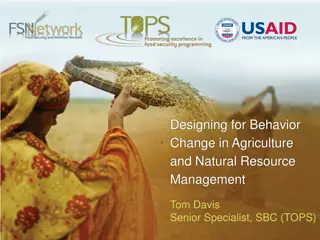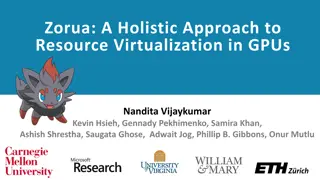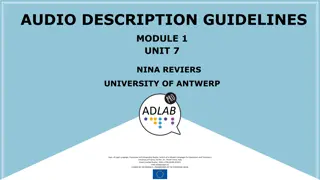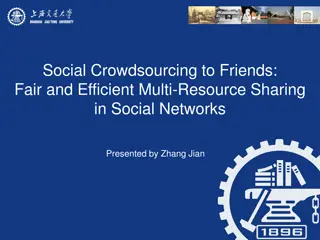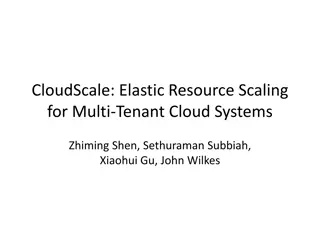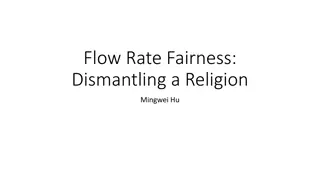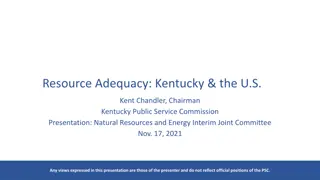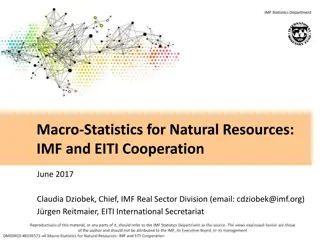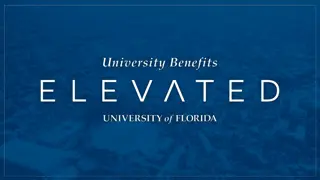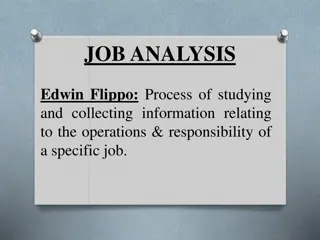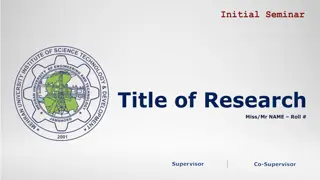Efficient Resource Mobilization and Management Strategies by Dr. Abraham Maliet Mamer
This content discusses efficient resource mobilization and management strategies, emphasizing the importance of understanding the typical cycle of resource regime, defining resources, identifying resources, and mobilizing resources effectively. It provides insights into resource allocation methodolo
1 views • 12 slides
Professional Learning Framework for Inclusion and Wellbeing in Scottish Education
The Professional Learning Framework emphasizes the importance of inclusion and wellbeing in Scottish education, aiming to support educators in enhancing their understanding and practice. The resource provides insights on facilitating group learning, reflective activities, and promoting a safe space
2 views • 20 slides
Understanding the Patient Safety Incident Response Framework (PSIRF)
The Patient Safety Incident Response Framework (PSIRF) is set to replace the Serious Incident Framework (2015) within the NHS, marking a significant shift in responding to patient safety incidents. Its key aims include compassionate engagement, system-based learning, proportionate responses, and sup
5 views • 9 slides
Revised Municipal Accreditation Framework 2023 Overview
The Revised Municipal Accreditation Framework 2023 presentation discusses the purpose, MINMEC resolutions, legislative framework, and recommendations related to enabling municipalities to administer national housing programs. It outlines the progressive process of capacitation through accreditation
1 views • 37 slides
Modelling and Exploration of Coarse-Grained Reconfigurable Arrays Using CGRA-ME Framework
This content discusses the CGRA-ME framework for modelling and exploration of Coarse-Grained Reconfigurable Arrays (CGRA). It covers the objectives, architecture description, inputs required, and tools included in the framework. CGRA-ME allows architects to model different CGRA architectures, map ap
2 views • 33 slides
Comprehensive Overview of UNRMS Framework and Principles
UNRMS (UN Resource Management System) aims to promote sustainable resource management globally through innovative frameworks and principles. It encompasses various natural resources and supports sustainability at different scales. Stakeholders can use it to assess projects against environmental, soc
5 views • 10 slides
Habilitation: Independent Living Skills Training Resource for Children and Young People with Vision Impairment
The Curriculum Framework for Children and Young People with Vision Impairment (CFVI) provides core training resources focusing on Area 6 - Habilitation: Independent Living Skills (ILS). This resource aims to introduce the concept of habilitation, explore barriers to inclusion, and offer intervention
0 views • 20 slides
Priorities for Reforming Resource Accreditation in New England
Presentation by Sam Newell, Kathleen Spees, and John Higham sponsored by Massachusetts Attorney General's Office on reforming resource accreditation and the resource adequacy framework in New England. The discussion focuses on the primacy of winter risks, the need for broad reform beyond accreditati
0 views • 11 slides
Forward Capacity Market Resource Capacity Accreditation Discussion
Discussion on improvements to resource capacity accreditation in the Forward Capacity Market to support a reliable, clean-energy transition by accrediting resource contributions effectively as the resource mix evolves. Covers conceptual design, stakeholder schedule, and review of proposed enhancemen
0 views • 61 slides
Simulation Framework for Controlled Critical Infrastructures Subject to Natural Disasters
This research project focuses on developing a Simulation Framework, utilizing the I2Sim toolbox, to assess the impact of natural disasters on critical infrastructures. The framework includes creating a simulated disaster test environment, designing testing procedures to analyze disaster effects, dev
1 views • 19 slides
Population Resource Regions and Zelinsky's Classification
Geographers have long studied the relationship between population growth and resource adequacy, leading to the concept of Population Resource Regions (PRR) by W. Zelinsky. Zelinsky identified five types of PRR based on population-resource ratios, ranging from Type A with high resource utilization po
0 views • 8 slides
Introduction to Resource Management in Construction Industry
The construction industry operates in a dynamic environment with time, money, and resource constraints. This chapter focuses on resource management, optimization methods, and applications in construction. It covers the definition of resources, types of resources, and the importance of optimization i
2 views • 15 slides
Overview of Framework-based Regents Examination in Global History and Geography II
The Framework-based Regents Examination in Global History and Geography II for Grade 10 is aligned with the NYS K-12 Social Studies Framework. It was first administered in June 2019, with Grade 10 students taking the exam. There was an overlap period from June 2019 to June 2020 with the Transition E
0 views • 14 slides
DepEd Financial Management Objective and Framework Overview
The DepEd Financial Management Objective and Framework (FMOM) serves as a crucial tool for implementing good governance, transparency, and accountability in managing financial resources within the Department of Education. It outlines guidelines for improving efficiency and effectiveness in the alloc
0 views • 23 slides
The Learning Quality Framework: Empowering Schools for 21st Century Learning
The Learning Quality Framework empowers schools to aspire towards outstanding learning outcomes, nurturing creativity, independence, and preparing students for the challenges of the 21st century. It provides a developmental framework focused on creative, independent learners and inspirational teachi
0 views • 22 slides
Importance of Job Description and Job Specification in Job Analysis
Job description and job specification are essential components of job analysis, providing crucial data for HR managers to understand job requirements and find the right candidate. While not legal requirements, they play a vital role in recruiting, selecting, and placing employees effectively. Job de
0 views • 6 slides
Lancashire Assessment and Planning Framework: Enhancing Child Welfare Through Comprehensive Assessments
The Lancashire Assessment and Planning Framework outlines the approach for assessing and managing child welfare cases in Lancashire. It emphasizes the importance of effective assessment, planning, and interventions to meet the needs of children and families. The framework integrates tools like the C
0 views • 13 slides
Local Leadership Framework for Councillors Workshop Pack Overview
This workshop pack provides guidance and resources for councils to implement the Local Leadership Framework for Councillors, supporting both new and experienced council members in their roles. The framework offers insights, activities, and skills to enhance councillors' leadership capabilities and e
0 views • 28 slides
Understanding the Conceptual Framework of Financial Reporting
The Conceptual Framework of Financial Reporting for 2019 outlines key chapters focusing on objectives, qualitative characteristics, financial statements, elements, recognition, measurement, presentation, and capital maintenance. It emphasizes the importance of providing information on stewardship an
1 views • 13 slides
Overview of Standard Method of Resource Scheduling for Effective Project Management
Resource Schedule Documents (RSD) prepared using Standard Method of Resource Scheduling 1 (SMRS 1) facilitate efficient allocation, planning, and management of resources. The RSD includes sections detailing employer and contractor responsibilities, material issues, method statements, and charges. SM
0 views • 9 slides
Comprehensive Framework for Teacher Growth in Yukon
The Framework for Teacher Growth in Yukon is a detailed description of effective teaching divided into four domains: Planning and Preparation, Classroom Environment, Instruction, and Professional Responsibilities. It provides clear targets for teacher development and offers specific guidance on what
0 views • 14 slides
Understanding the Economic Problem: Choices and Resource Allocation
This comprehensive study covers key concepts in economics, such as the economic problem, cost-benefit analysis, resource scarcity, production possibilities, and distribution of resources. It delves into the importance of costs and benefits in decision-making, categorizing them, and identifying varia
0 views • 16 slides
Overview of Semantic Web and RDF Concepts
This content delves into concepts related to Semantic Web, RDF (Resource Description Framework), and formalisms of Trust Reasoning Representation. It covers topics such as RDF resource description, triple models, machine interpretation challenges, and the role of key figures like Timothy John Berner
0 views • 38 slides
Understanding the Importance of 4-H Natural Resource Clubs for Youth Development
Exploring the significance of 4-H Natural Resource Clubs through insights from surveys conducted among 4-H members, Extension Educators, and Natural Resource Professionals. The data highlights motivations, barriers, and suggested resources to enhance participation in natural resource projects, empha
0 views • 17 slides
Moving Instructional Tasks to Teacher Resource Link - Richard Woods, Georgia's School Superintendent
Richard Woods, Georgia's School Superintendent, is transitioning ELA and Math instructional tasks for students with significant disabilities from the Resource Board to the Teacher Resource Link (TRL) accessible through SLDS. Science and Social Studies items will soon be available on TRL as well. The
1 views • 12 slides
Behavior Change Strategies in Agriculture and Resource Management
Designing for Behavior Change in Agriculture and Natural Resource Management is a crucial aspect of project planning for maximum effectiveness. The training provided offers a practical behavioral framework for food security implementers through sessions focusing on advantages of using DBC, understan
2 views • 28 slides
Zorua: A Holistic Resource Virtualization in GPUs Approach
This paper presents Zorua, a holistic resource virtualization framework for GPUs that aims to reduce the dependence on programmer-specific resource usage, enhance resource efficiency in optimized code, and improve programming ease and performance portability. It addresses key issues such as static a
0 views • 43 slides
Exploring the Art of Descriptive Writing
Descriptive writing aims to immerse readers in a sensory experience by vividly portraying people, places, or things through carefully chosen details. Description paragraphs should focus on action over sensations, providing essential information in a clear, detailed, and chronological manner. The ele
0 views • 5 slides
Audio Description Guidelines in Modern Languages for Translators and Interpreters
Explore the various types and importance of audio description guidelines, covering topics like what to describe, when and how to describe, and dealing with thorny issues such as subjectivity and film techniques. Discover the differences between general approaches and strategies, along with examples
0 views • 17 slides
Fair and Efficient Multi-Resource Sharing in Social Networks
This paper explores the concept of fair and efficient multi-resource sharing in social networks, presenting a credit market-based framework for charge-free computing resource sharing. It addresses the challenges of escalating data volumes and the need for collaborative resource allocation strategies
0 views • 21 slides
Understanding Resource Description Framework (RDF) for Semantic Web
Resource Description Framework (RDF) is a key data model for the Semantic Web, providing a standard way to represent knowledge through subject-predicate-object triples. RDF serves as the foundation for various knowledge representation languages and ontology tools on the web. Through RDF, relationshi
0 views • 36 slides
CloudScale: Elastic Resource Scaling for Multi-Tenant Cloud Systems
CloudScale is an automatic resource scaling system designed to meet Service Level Objective (SLO) requirements with minimal resource and energy cost. The architecture involves resource demand prediction, host prediction, error correction, virtual machine scaling, and conflict handling. Module 1 focu
0 views • 37 slides
Challenges of Flow Rate Fairness in Network Resource Allocation
Addressing the concept of flow rate fairness in network resource allocation, this content explores its limitations and challenges. Despite being a goal in protocols like TCP, the practicality and enforceability of flow rate fairness are questioned. It highlights the inadequacy of flow rate as a meas
0 views • 15 slides
Resource Adequacy in Kentucky and the U.S.: Regulatory Insights
Presentation by Kent Chandler, Chairman of the Kentucky Public Service Commission, highlighting the significance of resource adequacy in ensuring reliable electricity supply. The role of regulatory agencies like PSC in reviewing utility investments, integrated resource planning, and the distinction
0 views • 14 slides
IMF Statistics Department - Natural Resources Statistical Tools
IMF Statistics Department has developed two statistical tools, the Revenue Template and National Accounts Template, to help countries analyze government revenues and natural resources in national accounts. These tools are crucial for policymaking in countries heavily reliant on natural resource reve
0 views • 9 slides
Employee Community Resources at UF: Family Resource Coordinator Services
Providing UF employees access to valuable community resources through the Family Resource Coordinator, including discounted services for childcare, housing, health & wellness, transportation, entertainment, campus discounts, food, and more. Additional on-campus resources such as the Field and Fork P
0 views • 6 slides
Overview of RDA: Resource Description and Access
An in-depth look at RDA (Resource Description and Access), covering its origins, development by the Joint Steering Committee, transition from AACR3, and key concepts such as representation principles and data sharing beyond libraries. The test period of RDA Toolkit revealed its impact with over 10,0
0 views • 27 slides
Understanding Job Analysis and Job Description
Job analysis, as defined by Edwin Flippo, is the process of studying and collecting information about the operations and responsibilities of a specific job. This crucial task involves various components such as creating a detailed job description outlining the job title, qualifications, and more. En
0 views • 14 slides
Enhancing Capacity Planning for Peak Demand and Flexible Resource Requirements
Addressing the challenges in identifying capacity needs for utilities and regions, the discussion covers PowerSimm's approach compared to other modeling tools, resource capability characterization, and regional resource sharing opportunities. The article also reviews comments on NorthWestern's syste
0 views • 17 slides
Research Framework and Methodology in Science, Technology, and Humanities
This study delves into developing a robust research framework and methodology in the fields of science, technology, and humanities. It covers literature review, research gap identification, formulation of research questions and objectives, theoretical framework description, and research methodology
2 views • 13 slides

